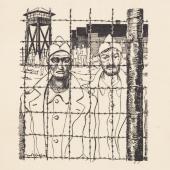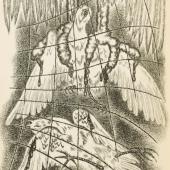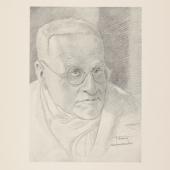-

L.-G. Villeroy, Comme de l’an 40!..: souvenirs & croquis sur ‘la drôle de guerre’ et la captivité: les illustrations sont de Jacques Bidault, Maxime Rihet, André Finot et Charles Pinson
-

Madeleine Legrand, À Fresnes: témoignage précédé d’un poème de Paul Éluard; hors texte de Valentine Hugo
-

Buchenwald: scènes prises sur le vif des horreurs nazies: 78 planches dessinées par A. Favier, P. Mania, Boris; préface de C. Pineau; textes de P. Mania
-

Boris Taslitzky (1911–2005), 111 dessins faits à Buchenwald, 1944–1945, présentés par Julien Cain
Prisoners’ books
Literature of the Liberation
Books by returning prisoners form the largest single category in the collection. They divide into two groups: the books by prisoners in German prison camps or labour camps, and books by survivors of the concentration camps. Many of these are books of poetry, as if the experience of the prisoner was too intense to be expressed in any other form. There were 1,600,000 French prisoners of war in Germany and the majority did not return to France until after peace was declared in May 1945. They were keen to tell their stories and the speed with which survivors’ accounts were published was remarkable. Pelagia Lewinska’s book published in September 1945 was the first book published in France by an Auschwitz survivor. Of accounts of the camps published in France over a third came from survivors of Buchenwald, the main destination for French deportees alongside Auschwitz. But by 1946 the public’s interest in survivor testimony had waned. This was not only due to its overwhelming volume and empathy fatigue, but because survivor testimony brought the French population face to face with the implications of their collaboration with Nazism. According to Ruth Kitchen this history of wartime shame continues to have relevance in political, historical and cultural debates in France today. The books themselves remain as deeply personal and vivid accounts of survival, deprivation, and boredom, but also as celebrations of comradeship with fellow prisoners of war.